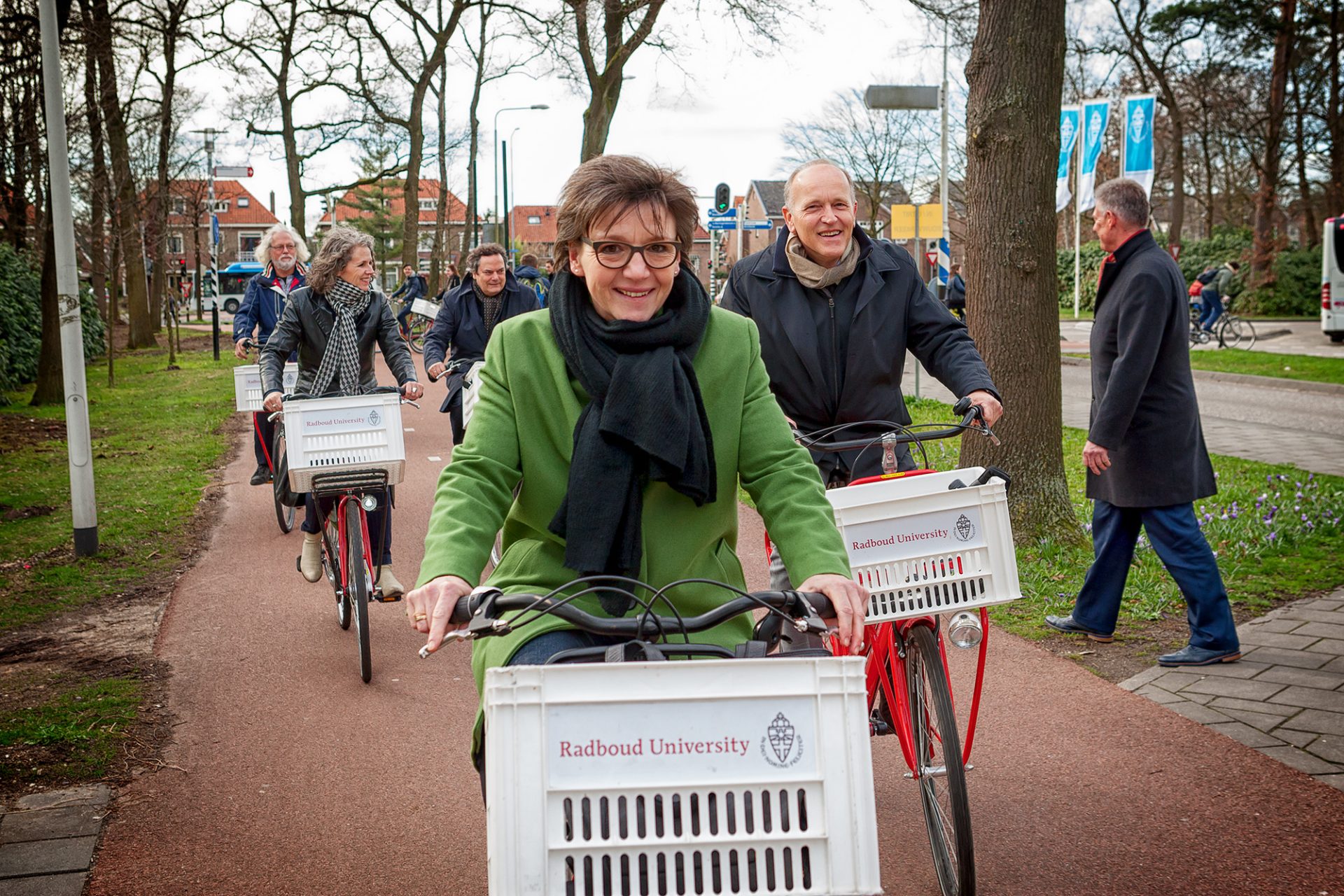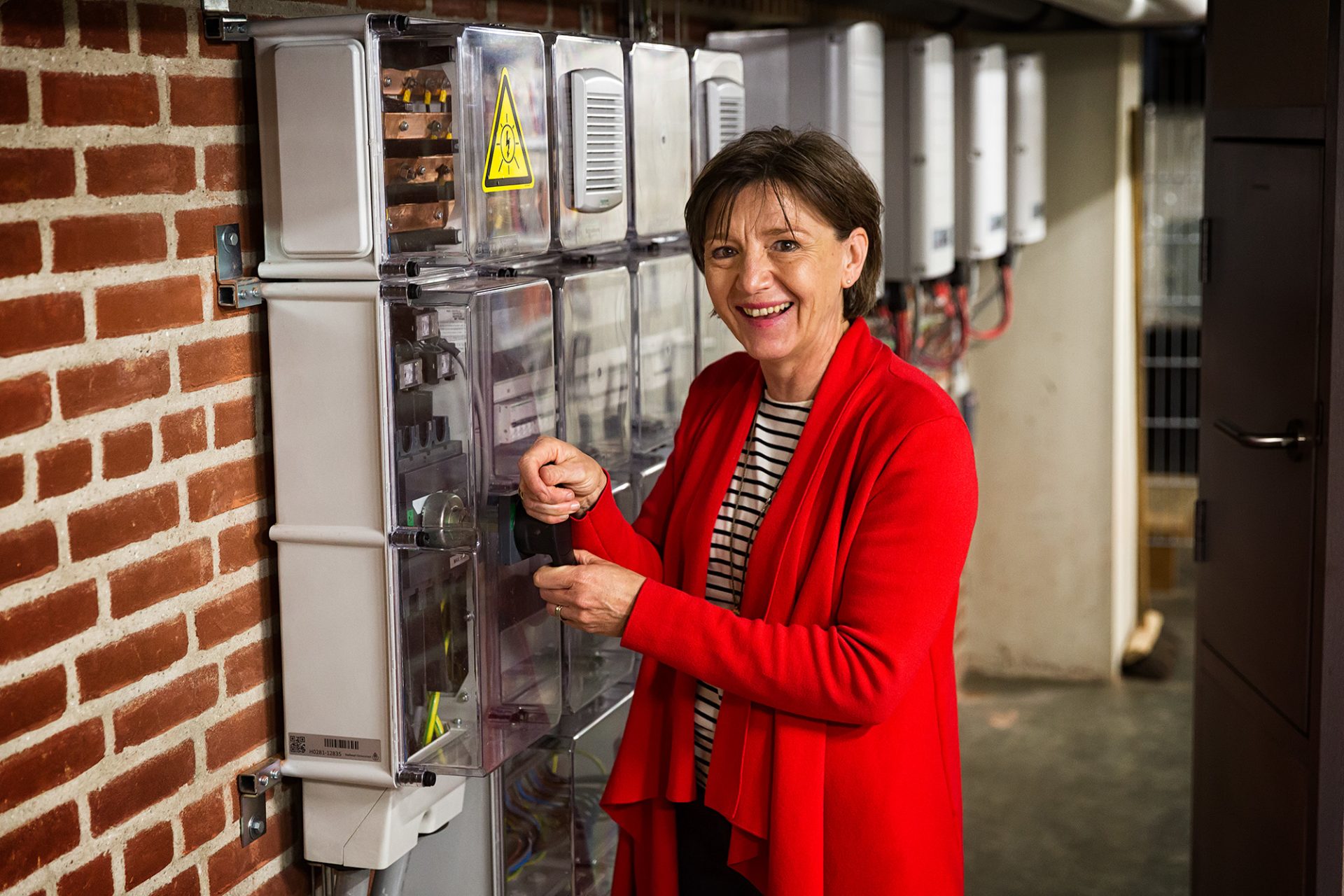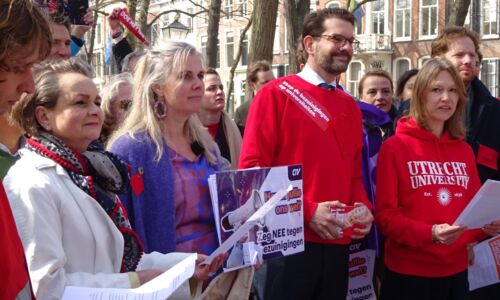Radboud University really took off under the direction of Wilma de Koning
-
 Photo: Dick van Aalst
Photo: Dick van Aalst
As vice president, Wilma de Koning dug into quite a few difficult files in Nijmegen. Those who worked with her paint a picture of an inspired administrator who did not easily change her mind. She initiated major changes without losing sight of ‘the people’. Here’s a profile of the departing Vice President of the Executive Board.
‘Do you know a suitable woman?’ was the question Gerard Meijer, President of the Executive Board of Radboud University, asked Secretary Jef van de Riet in 2013 when the University was looking for a successor to Vice President Anton Franken. Never before had a woman been a member of the board – so it was about time, was the general thought at the time.
Van de Riet did know someone. ‘I knew Wilma de Koning from my time in Tilburg,’ he says. ‘She succeeded me as secretary and general managing director at Tilburg University and then became member of the board at Fontys.’ Van de Riet left for Nijmegen in 2005, not knowing that De Koning would heed his advice and was to follow the same path eight years later.
Back in in 2013, De Koning herself expressed her hope to Vox that she was not hired because she was a woman. Quality had to be the decisive factor. ‘I’m not in favour of quotas for women,’ she added.
Van de Riet: ‘Wilma did not get the job because she’s a woman. We found it perfectly normal to see if there were strong women available for the position. I thought she did very well as a member of the board in Tilburg and that it was worth a try to see if she’d click with our board as well.’
‘When I became dean, I didn’t want to be the token woman either’
For someone who has spoken out against quotas for women in the past, De Koning has made a strong case for gender equality at Radboud University in recent years. Under her leadership – human resources policy falls within her portfolio – the percentage of female professors has continued to grow to almost 30 percent. The ambition for 2025 is that 36 percent of the academic staff will be women.
Dean Margot van Mulken of the Faculty of Arts finds this commitment perfectly compatible with her earlier statement about quotas. ‘When I became dean, I didn’t want to be the token woman either. But when you see things going askew as an administrator, you start to think differently. That may also have been the case with Wilma.’
Modernisation operation
As vice-president of Radboud University, De Koning – trained as a business economist and accountant – had to deal with some difficult issues in her portfolio. Human resources policy was one, but real estate, finance, ICT and the reorganisation of the support services also were her responsibility.
‘Wilma is ambitious and enthusiastic,’ says Van de Riet, who retired in 2018. ‘She deals with a lot of issues simultaneously.’ Van de Riet also was surprised about the speed with which she initiated change as vice president. ‘I sometimes wondered if there shouldn’t be more intermediate steps. She does have a streak of impatience in her character, you know.’
According to Dean Margot van Mulken, the university – with De Koning as the driving force – has made large-scale modernisation efforts in recent years. ‘The faculties are evaluated every few years, but this does not apply to the supporting services. Does the way they are organised meet standards?’ De Koning therefore began to examine her portfolio to evaluate the work of these services. A mammoth task, which would not excite many people. Van Mulken: ‘But De Koning liked to do it. I find that admirable.’
According to former Works Council chair Bernadette Smelik, De Koning has achieved much in difficult dossiers. ‘I’ve come to know her as someone who looks for solutions in a constructive way.’ Smelik mentions the new Work and Security Act as an example. This Act was intended to result in more permanent contracts but had the opposite effect. Smelik: ‘Everyone complained about that. Wilma then said: let’s see what else can be done. We had some good discussions on the matter.’

Smelik and Van Mulken both characterise her style as ‘businesslike, but committed’. Alongside Daniël Wigboldus (president) and Han van Krieken (rector), De Koning played the manager on the Executive Board. Smelik: ‘She wants to discuss the matters on hand and not waste too much time on procedures. If a crisis situation arises, she takes the reins firmly in hand and becomes directive. She doesn’t lose her cool and takes the necessary steps. You saw that, for example, when the corona pandemic broke out. Many of the staff members soon knew what they were facing.’
Van Mulken remembers how her faculty was visited by a visitation committee which threatened to advise the Accreditation Organisation of the Netherlands and Flanders (NVAO) to issue a negative judgment on one of the programmes. ‘Wilma then came up with a very assertive response. She defended us well. When the crisis was over, she turned around and said to us: we do not ever want to go through this again. How are we going to get it done? Then I thought: this is how it has to be. First you have to stand up for your people, and then you have to implement internal improvements.’
Room for negotiation
Anyone who wants to change De Koning’s mind has their work cut out for them, Fatbardha Selmani noticed. As Chair of the University Student Council in the academic year 2017-2018, she tried to get all kinds of things done by addressing the Executive Board. ‘To convince Wilma, I had to prepare myself really well,’ says Selmani looking back. ‘She has a thorough knowledge of the files. If I was slightly wrong about something, she would correct it immediately.’
Selmani has much appreciation for De Koning, especially because the latter is one of the few women in a predominantly male environment. She noticed that De Koning commanded respect from colleagues. ‘When I was chair of the USR, Wilma didn’t have to prove herself any more. She was very well known at the University.’
But it was not always easy to work with her as a student council member, says Selmani. ‘She doesn’t provide much room for negotiation, which is challenging. You really have to convince her with sound arguments.’ Selmani was chair of a student council that regularly clashed with the Executive Board, for example about how to spend the funds generated by abolishing basic student grants. It was not unusual for De Koning to come down hard on such an occasion. Selmani: ‘We were very critical and asked a lot. But that was also because the board gave us so very little. Sometimes I thought she could have been more accommodating.’
‘There was no small talk, we immediately got down to the nitty gritty’
In the corridors of the University, it was sometimes quite exciting to have to deal with Wilma, according to Selmani. ‘There was no small talk, we immediately got down to the nitty gritty. She’s more formal and businesslike than the other members of the board.’
Smelik does recognise this, although she has also come to know another side of De Koning. ‘She’s also very committed and takes responsibility for decisions. When the Institute for Applied Social Sciences (ITS) was closed down in 2016, she had a really hard time. She realised that the board was making a decision that deeply affected the lives of dozens of employees very well. She’s not a robot.’
Former secretary Jef van de Riet also agrees: ‘Wilma has no problems taking difficult decisions, but she’s not a slippery executive like Mark Rutte. She’s very socially engaged.’

What will certainly have affected her sleep is the affair surrounding the Honours Academy in 2015. Three male staff members were accused of transgressive and intimidating behaviour. The university wanted to dismiss one of them, but the Court put a stop to that. It was De Koning who, on behalf of the University, backed down before the subdistrict court and had to hear that the University was guilty of violating the standards of good employment practice.
It must have been a lesson that De Koning – as the only sitting member of the Executive Board who experienced the Honours Academy crisis – still remembers vividly. Especially now that a similar case is playing out at the Faculty of Philosophy, Theology and Religious Studies. Professor Paul Bakker, who was supposed to become dean, was discredited last year for ‘acting inappropriately’. Last week it became known that he will be absent as a lecturer for at least another 18 months.
New position
Wilma de Koning (1962) will start as Managing Director of the Royal Netherlands Academy of Arts and Sciences (KNAW) in Amsterdam on 1 July. She took office as Vice President of Radboud University in 2013. Prior to that, she was a member of the Executive Board of Fontys Hogescholen.
The question therefore arises as to what De Koning has done to create a safe working environment, particularly for women. According to Bernadette Smelik, what De Koning has achieved in that area is mainly that the problem of social insecurity has become more open to discussion. ‘She has really done a lot in that respect, such as hiring an external company to organise role-plays about manners in the workplace. But of course the University is still far from being an inclusive environment. A culture change is needed and, for example, the dependency relationships between employees also need to be tackled. That takes a lot of time.’
Catholic identity
What also was a concern for De Koning was the decision of the bishops to deprive Radboud University of its Catholic title. Van Mulken: ‘I was once at an event of the Catholic Documentation Centre and she happened to be there too. As a celebration, they had organised a quiz on Catholic history. I come from a Catholic family and I’m a true Limburger, so I thought I was going to win that prize. But I knew nothing at all, and she knew everything. I knew she attached great importance to the University’s Catholic identity, but not that she knew so much about it.’
Wilma de Koning has always lived in North Brabant while working in Nijmegen. Margot van Mulken visited De Koning’s home on a few occasions. In the garden of her refurbished farmhouse, which was partly let as a B&B, deans and members of the board would gather among the corn fields for the annual barbecue. At times like that, she got to know De Koning a little better. ‘She is much more jovial and funny than many people think. From what I gather, the room where the board members meet is often filled with a lot of laughter. However, the atmosphere on the Executive Board has not always been so jolly.’




